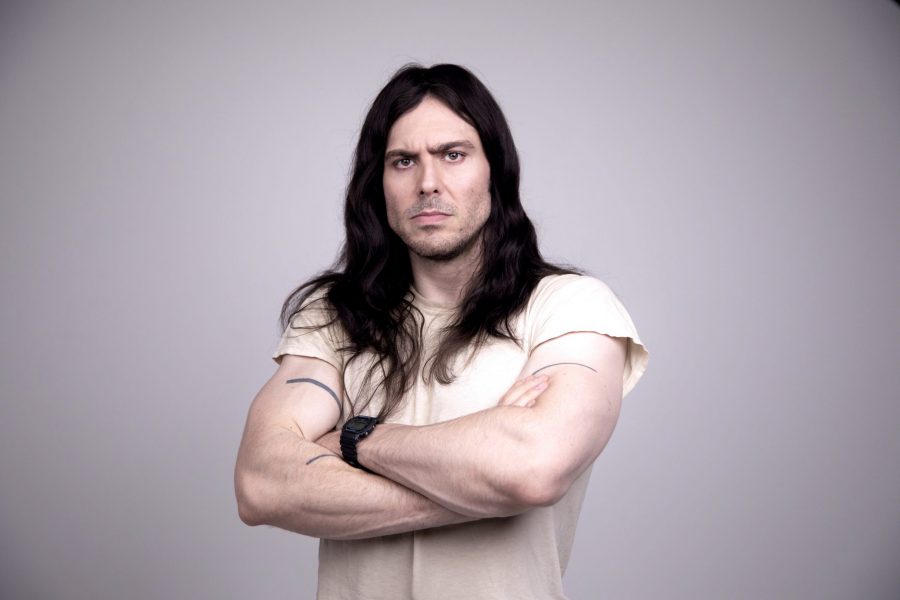REVIEW: Andrew W.K. orchestrates choreographed chaos on ‘God is Partying’

In 2018, Andrew W.K. released You’re Not Alone, his first new rock album in 12 years. During his contractually inspired hiatus, he spent time variously as an advice columnist, a children’s show host and a motivational speaker, each new venture gaining him new fans. Perhaps as an acknowledgment of fans gained during that time, or perhaps out of habit, You’re Not Alone was a diverse collection of subgenres and styles anchored by the messages from his motivational speaking, even including spoken inspirational interludes.
God is Partying
Andrew W.K.
Napalm Records, Sept. 10
9/10
That message of positivity, however, has overshadowed how dark his early music was. His debut and breakthrough album, 2001’s I Get Wet, was a raucous display of controlled party chaos. Everyone remembers the joyous choruses about partying, but the verses to every track on the album were dark, occasionally violent, and bordering on post-apocalyptic.
With his latest album, God is Partying, Andrew W.K. is clearly getting back to his roots. The hard rock chaos has returned in full force, mixed with slower interludes of emotional darkness. But what was an undercurrent of darkness 20 years ago is now at the forefront; what was once a subtle message has become more like a brick to the face.
Opening track “Everybody Sins” really drives that point home, starting with the soaring feel of his last album before dropping hard and fast into a more grinding, melodic hard rock. It still maintains some aspects of his later work, but with a harder edge and lyrics that, if released during the Satanic panic of the ’80s, would have seen his albums burned in public squares.
And that’s the calm before the storm.
“Babalon” turns the hard rock up to 11. It exemplifies the idea that this album is set 20 years after I Get Wet, when the idea of partying through the apocalypse has gotten harder to cling to as the apocalypse has dragged on and on for decades and everything has gotten worse. It’s slower than “Party Hard,” it’s heavier, it’s not celebratory in the same way, and the religious references are not played for inspiration.
Sometimes an album can feel jumbled when the artist didn’t put a whole lot of thought into the order of the songs. That’s not a dealbreaker, especially in the streaming era. The choice to follow “Babalon” with a piano-driven ballad like “No One To Know” may initially make you wonder if that’s the case.
After hearing the album as a whole, though, it becomes obvious that it was a thoughtful choice. The songs are more connected musically than they appear at first blush, and it begins a running theme of shifts in tone that feels more than a little like the 18 months preceding the album’s release. If “Everybody Sins” was the transition from old to new and “Babalon” was rage and blame, “No One To Know” is loneliness and isolation. Those feelings back to back may have been unusual in 2019. But in 2020 and 2021 they’re very familiar.
Then Andrew W.K. offers a glimmer of hope and inspiration right in the center of the chaos with “Stay True To Your Heart.” There’s darkness but through it an inner strength. That does not last.
A string-heavy interlude leads into the darkest song on the album, “I’m in Heaven.” Backed by a melodic death metal riff, both the song and the accompanying video for “I’m in Heaven” makes me worry for Andrew W.K.’s mental health. It is a lot, but in the best possible way for metal fans.
Then we’re dropped into “Remember Your Oath,” an emotional ballad that tells of forgetting lessons and repeating mistakes. It follows the album’s religious theme with talk of letting demons in, but it could be about relapse or about ruining a relationship; it’s hard to tell. Whatever the mistake may have been, the agony of the loss that it wrought is palpable in the vocals.
“My Tower” is more overtly about the end of a relationship. It’s also metal-inspired but with a downtempo thrash metal sort of vibe—almost a ballad but with heavy distortion. It’s simultaneously angry and wistful, which is a tough balance to pull off, but Andrew W.K. manages to do it; it’s bizarre and impressive. There’s a hostility when he sings, “I’ll never see you again” over and over in the chorus, but a longing when he sings, “We’ll never see each other again” on the bridge.
“And Then We Blew Apart” concludes the album. It’s the sort of soaring song you’d hear at the climax of a movie. The lyrics are simple: “We came together and then we blew apart.” It could easily be about the togetherness borne by mutual fear from the spring of 2020, followed by, well, everything that happened since then. But it could also be a personal tale. The meaning may vary for listeners, especially considering its position at the end of the album.
Whether God is Partying is about the pandemic, or Andrew W.K.’s divorce, or something less public, or even if it’s a wholly fictional tale continuing the world of I Get Wet, the album tells a story. It’s choreographed chaos, and artfully disjointed, so the message of that story certainly won’t be the same for everyone. Intentional or not, it’s one of the better reflections of the emotions of the past year and a half.
It’s hard to tell what Andrew W.K. will do next. His career has always revolved around sowing confusion and subverting expectations. Whatever the future holds for him, it’s obvious he’s back in peak musical form.
Follow editor Daniel J. Willis at Twitter.com/BayAreaData.
